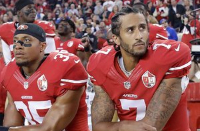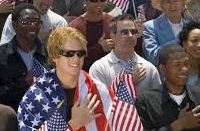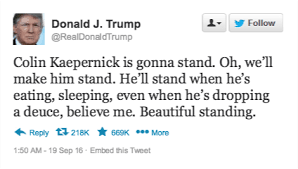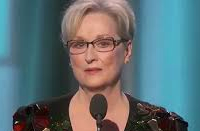 In 2016 and 2017, there was an uproar over a black football player, Colin Kaepernick, quietly kneeling on the field during the national anthem rather than standing with the rest of his team. He was protesting the repeated killing of black men by police in America, and this lead to many months of heated arguing among Americans.
In 2016 and 2017, there was an uproar over a black football player, Colin Kaepernick, quietly kneeling on the field during the national anthem rather than standing with the rest of his team. He was protesting the repeated killing of black men by police in America, and this lead to many months of heated arguing among Americans.
All of this furor about “taking the knee” was actually over a basic misunderstanding: Kaepernick’s kneel had nothing to do with disrespecting the anthem. Rather, it was a protest over a gross injustice, expressed in the only way he knew would get visibility for an important issue that mattered to him.
If you don’t remember much about this topic that seemed to have all of American arguing, here is what Eric Reid said about it in the New York Times in September. He describes very well the thought behind what he and Kaepernick set out to do.
A Fox News-watching/Trump-supporting friend was incensed that people kneel during the anthem, and angrily claimed that the issue shouldn’t have been “made political.” He also said that when it came to American’s rights, the only opinions that mattered were those from people who had served in the military. And finally, although it was in reaction to a different topic, this person has also expressed disgust over how celebrities should stop pushing their views on others.
There are four distinct topics in here, and there is so much wrong with it that I decided to tackle it in my blog, one point at a time:
1. Only opinions from those who have served in the military matter.
Like in many other countries, a portion of our people go into the military while the rest of us stay home and keep the economy going. (Personally I am not comfortable with the fact that it is typically the poor who fight and the rich who don’t, but let’s choose one topic to discuss at a time!)
I am fervently respectful of those who battle for us, ostensibly to protect the country and the rights that we all enjoy. Not all of us fight, but all of us enjoy those rights; and that we do not fight does not diminish our privilege to enjoy those rights. Put another way: Just because you and I did not fight or die to defend the rights spelled out in the US Constitution, that does not in any way affect our eligibility to enjoy those rights or to have opinions about them.
2. Everyone must stand for the anthem, and it is wrong not to.
 What this statement comes down to is freedom of speech. There are countries in this world in which, if you rolled your eyes and made a joke about the president, you could be killed. Not so in the United States.
What this statement comes down to is freedom of speech. There are countries in this world in which, if you rolled your eyes and made a joke about the president, you could be killed. Not so in the United States.
The right of free speech that we enjoy in this country is so astoundingly important that we must safeguard it. Having freedom of speech means we have a lot of people being angered by others voicing contrasting opinions, that differ but the flip side of this is that it means YOU are free to express YOUR opinions.
Of course there needs to be a line that can’t be crossed. For example hate-speech or malicious slander is harmful and shouldn’t be tolerated: nobody is free to spew hateful speech. But we must be careful that these lines we establish around our freedom of speech do not create a slippery slope that erodes that very freedom. For example, while we do not allow hate speech, we are very careful to define “hate speech” very narrowly. Watching out for that slippery slope is part of what our Supreme Court does — interpreting new cases to see if it applies, and keeping interpretations of our constitution moving forward into modern times. Here’s a primer on what free speech is.
In the context of free speech, “speech” isn’t just words: it includes actions I take to express my point of view. I can wear an anti-Trump pin, you can wear an anti-abortion pin, and Kaepernick can kneel during the playing of the national anthem. For anyone to tell me that I cannot remain seated during the playing of the anthem, or that I cannot kneel during it, is absolutely impinging on my free speech. If I don’t want to stand, I won’t stand: that is my right.
Frankly, I think the people insisting I stand during the national anthem are exhibiting extremely un-American behavior: they obviously don’t care about this critically important right of free speech and are willing to diminish it over something so silly as standing for a song. And then there’s that ominous slippery slope: What’s next? Will I be told I cannot express political opinions or even vote because I am an atheist? Will I be told I can’t speak in a forum about retirement or collect Social Security (when I’m old enough) because I didn’t vote Republican or serve in the military?
We must keep our right to free speech from sliding down the slippery slope.
3. This issue shouldn’t be political.
 Many republicans have pointed at the democrats and yelled that the snowflakes made this issue political, but it became political when Trump tweeted about it. You can’t get more political than the POTUS chiming in with a very strong, completely unsolicited opinion. He could have let it die down as his advisors tried to get him to do, but he kept bringing it up. It’s absurd, but there it is. We wouldn’t even be having this discussion if people would have sanely discussed it instead of launching immediately into a furor — which agin, I put solidly at the feet of the POTUS… who made it political.
Many republicans have pointed at the democrats and yelled that the snowflakes made this issue political, but it became political when Trump tweeted about it. You can’t get more political than the POTUS chiming in with a very strong, completely unsolicited opinion. He could have let it die down as his advisors tried to get him to do, but he kept bringing it up. It’s absurd, but there it is. We wouldn’t even be having this discussion if people would have sanely discussed it instead of launching immediately into a furor — which agin, I put solidly at the feet of the POTUS… who made it political.
It is important to note that Trump also has a right to free speech. However, many presidents in the past have been aware that the things they say greatly influence the national (and international) conversation, so they temper what they say or keep their opinions to themselves. This president doesn’t do that, and so he inflames the American people into the most devise the population has been perhaps since the US Civil War.
4. Celebrities shouldn’t push their views on everyone.
 There have been a lot of derisive comments from people in the last few years when a celebrity has taken a stand for something they think is important. But here what I think: If you find yourself having a platform and you decide to use that platform to try to do some good for something that is important to you, then go for it!
There have been a lot of derisive comments from people in the last few years when a celebrity has taken a stand for something they think is important. But here what I think: If you find yourself having a platform and you decide to use that platform to try to do some good for something that is important to you, then go for it!
Imagine if you regularly volunteer for a local homeless shelter, and then one day something happened that brings you a lot of attention. Maybe you won a big reward or you discovered how to turn dust-bunnies into diamonds — the reason doesn’t matter. Suddenly news reporters are asking you to do interviews or maybe give a televised speech. How cool would it be for you to say something about that homeless shelter, or suggest to people that they volunteer for THEIR local homeless shelters? Use your platform to do a little good in the world!
I think it’s awesome that celebrities do this, and in fact one could say they are missing an important opportunity if they don’t do it.
When Kaepernick kneeled, that is exactly what he was doing. He was using his platform to give visibility to the fact that African Americans are disproportionately being killed by police. It is a matter that is important to him, and he used his platform to do something about it. (That said, Kaepernick has paid dearly for his activism in that he was not picked for a team the following year, and it looks like his co-activist Eric Reid may face a similar snubbing.)
Here’s an article that discusses other times that celebrities have used their opportunity to support their political point of view. Syracuse.com: 11 times celebrities gave political acceptance speeches at award shows